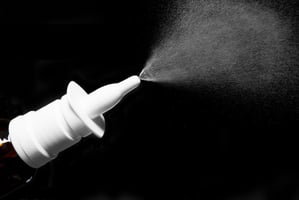Esketamine Plus Antidepressant Maintenance Delays Relapse in Refractory Depression, Study Finds
 |
Previous studies have confirmed the short-term antidepressant efficacy of esketamine, which was recently approved by the Food and Drug Administration for treatment-resistant depression. (AJP in Advance in May published a study showing patients with treatment-resistant depression who took esketamine nasal spray plus a new oral antidepressant for 28 days experienced significant symptom improvements over those treated with placebo nasal spray plus a new oral antidepressant.) Still, little is known about the long-term effects of esketamine, according to Ella Daly, M.D., of Janssen Research and Development and colleagues.
This recent study is part of SUSTAIN-1, a multi-phased, randomized, controlled trial designed to compare 56 mg or 84 mg of esketamine nasal spray plus an antidepressant versus placebo nasal spray plus an antidepressant in patients with treatment-resistant depression.
Daly and colleagues enrolled 297 adults with depression who had achieved a stable response (n=121) or stable remission (n=176) with esketamine plus an oral antidepressant during the 16-week first phase of SUSTAIN-1. Stable response was defined as a minimum 50% reduction from baseline in the Montgomery-Åsberg Depression Rating Scale (MADRS) in the last two weeks of initial treatment. Stable remission was defined as a MADRS score of 12 or lower for at least three of the last four weeks of initial treatment.
For the maintenance phase of the study, the participants were randomized to continue esketamine-antidepressant treatment or switched to an antidepressant plus placebo nasal spray. The participants remained in this phase until they had a depression relapse or withdrew from the study. Relapse was defined as a MADRS score of 22 or higher for two consecutive assessments or hospitalization for worsening depression, suicide attempt, suicide prevention or completed suicide, or another clinical event indicating relapse.
“Continued treatment with esketamine and antidepressant significantly delayed relapse compared with treatment with antidepressant and placebo,” Daly and colleagues wrote. Among patients who responded, 25.8% who continued esketamine and 57.6% who received placebo nasal spray experienced depression relapse. Among those who remitted, 26.7% in the esketamine group and 45.3% in the placebo group had a relapse. The authors calculated that esketamine reduced relapse risk by 51% among stable-response patients and by 70% among stable-remission patients.
The researchers reported no new or unexpected safety findings.
For related information, see the AJP in Advance article “Efficacy and Safety of Flexibly Dosed Esketamine Nasal Spray Combined With a Newly Initiated Oral Antidepressant in Treatment-Resistant Depression: A Randomized Double-Blind Active-Controlled Study.”
(Image: iStock/asadykov)






